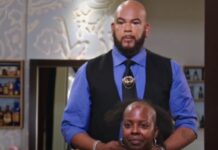 *I touched upon this last week when I reviewed the meaning of Dr. Martin Luther King’s message. The reason that column was possible is because there are multiple perspectives from which African-Americans approach American society.
*I touched upon this last week when I reviewed the meaning of Dr. Martin Luther King’s message. The reason that column was possible is because there are multiple perspectives from which African-Americans approach American society.
Because there are many different perspectives for African-Americans creates a contrast for people of color today compared when Dr. King was alive. Similarly the fact that Dr. King was universally recognized as the leader of the black community substantiates the idea that a high majority of black people had the same experience.
On the other hand even having an African-American president has yielded no clarity on if there an unquestioned leader of the black community and who that person might be. Cases in point are the conversations around Stacey Dash, and Raven Symone.
Most recently Stacey Dash came out against: the Black Entertainment Television (BET) network giving awards, BET from existing at all, and the concept of black history in general. As a working actress Dash probably has a better idea of how acting awards are handled than most people. And she’s entitled to her informed opinion. Nevertheless she can be wrong. Her comments regarding eliminating black history from American consciousness reveals her ignorance about how history is taught in this country. Those topics that are not actively advocated for do not get taught to students. That is one reason Dash is wrong and black history month is still relevant. But I respect that from her perspective it might be difficult to see and understand that fact.
Raven Symone has defended a television personality characterizing Michelle Obama as resembling a monkey and attacked the possible choice of Harriet Tubman as the person to go on the new design of the ten dollar bill. Symone’s remarks illustrate the fact that the African-American community is diverse (a black woman didn’t automatically fall on their knees at the mention of an Obama!). Symone also showed that there is room for a diversity of opinion on black history when she challenged the choice of Tubman for our currency – even if she picked the other no-brainer she mentioned many names. Symone’s comments are not as plainly incorrect as Dash’s but her opinions did go against commonly held beliefs about black people’s feelings regarding the first lady and Harriet Tubman. Still Symone is entitled to those opinions that are neither strictly liberal or conservative.
The controversies that these women have found themselves in are largely a result of stances that a vocal subset of black people disagree with. So even while they clearly show that not all black people think alike on every subject, their comments become newsworthy because most people assume that a high majority of black people do conform to certain points of view. Unfortunately the current iteration of black history month reinforces this fact. Each year the same movements and people get attention (hello again Rosa Parks). The dark side of black history month is that as long as the same people (and only these people) are deemed worth the time it is easier to pigeonhole African-Americans today. After all, we only need to learn about certain historical black people because those people adequately sum up the black experience; so only certain today are important because they also adequately sum up the contemporary black experience.
The answer is not to eliminate black history month. The answer is to expand black history month beyond learning about the same handful of people. In addition the integration of historically underrepresented groups into the larger story of American history (as Dash implied) would work. This is a bit of having the cake and eating it too, I admit. But the legacies of black people and women (two groups that schools actually might plan something for in their respective months of February and March) in this country are large enough that such a double dose is warranted.
The key is not getting rid of black history. The key is defining it.
Trevor Brookins is a free lance writer in Rockland County, New York. He is currently working on a book about American culture during the Cold War. His writing has appeared in The Journal News. You can reach him at [email protected] or follow him on Twitter @historictrev.
We Publish News 24/7. Don’t Miss A Story. Click HERE to SUBSCRIBE to Our Newsletter Now!





